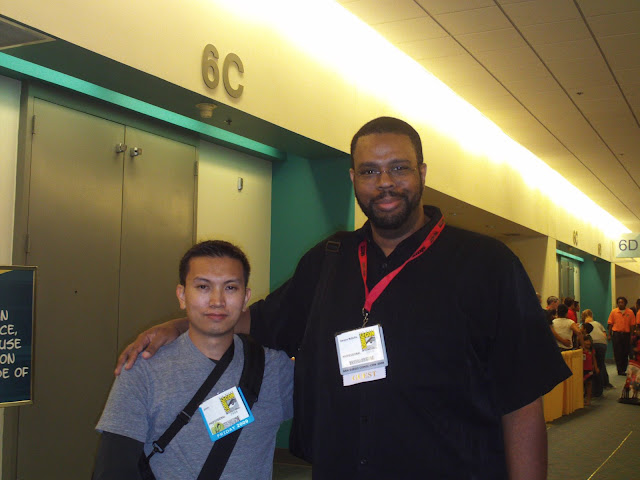Wednesday, February 23, 2011
Dwayne McDuffie (1962-2011)
Dead at 49, Dwayne McDuffie was an incredibly prolific comics and TV animation writer who, as a story editor and frequent scriptwriter for Justice League Unlimited, helped make that cartoon the most satisfyingly written DC Animated Universe show since Batman: The Animated Series. But McDuffie's greatest contribution remains Milestone Media, the indie comics company he co-founded in the '90s to make the way-too-white superhero genre more diverse and to give comics writers and artists of color more opportunities behind the scenes.
"It showed that there could be actual black people in comics," wrote comics reviewer David Brothers in a Black History Month tribute to McDuffie and Milestone that he posted a couple of weeks before McDuffie's death yesterday. "The company was full of people who looked, acted, and talked like people I knew. This is a big deal, believe it or not."
It was also a big deal for Asian American readers like myself who grew up in a multiracial world that wasn't being reflected enough in superhero comics (sadly, it still isn't) and were looking for comics that featured Asian characters who were raised in America like we were and weren't foreigners in corny dragon-themed or martial arts-themed costumes that were the Asian equivalent of the "headband and yellow disco shirt" that The Boondocks once joked about in regards to Luke Cage's costume. Milestone responded to the lack of Asian American characters in superhero comics by creating the immortal hero Xombi and Third Rail, a Korean member of the Blood Syndicate, a superhero team comprised of gangbangers who were mutated by radioactive tear gas during a police crackdown on gangs. Latino and gay characters also inhabited the Milestone universe.
The most popular and enduring Milestone creation is McDuffie's Static character, a.k.a. Virgil Hawkins, a constantly bullied inner-city high-schooler who gains the ability to manipulate electricity after being exposed to the aforementioned radioactive tear gas. When the original Static comic debuted in 1993, I was glad to finally come across a comic about teens where the high school setting was hardly as clean-cut as Riverdale High or whatever campus subjected Peter Parker's Spider-Can to frequent wedgies. In other words, Ernest Hemingway High resembled the school I went to. Virgil's campus was beset by gang violence and racial conflict, elements that were watered down but still addressed in Static Shock, a more kid-friendly animated version that McDuffie was also involved in.
There had been previous attempts by other publishers to target readers of color, but the characters of color in those titles weren't as fully realized or three-dimensional as Virgil and the other Milestone characters were.
I got to meet McDuffie at a 2009 San Diego Comic-Con panel about diversity in comics where one of the projects that were discussed was Secret Identities: The Asian American Superhero Anthology, a graphic novel that followed in Milestone's footsteps and featured a short story I created, "Sampler." As a teen, I enjoyed Static, Blood Syndicate and Icon, so I was thrilled to meet McDuffie, who praised our GN and called it long-overdue.
I also enjoyed McDuffie's work on Justice League Unlimited. He came up with the premise for "The Great Brain Robbery," an amusing episode in which The Flash and Lex Luthor switched bodies and Michael Rosenbaum, who played Lex on Smallville when he wasn't providing the voice of The Flash on JLU, got to voice both his live-action and animated alter egos. McDuffie also crafted the show's Cadmus arc, which gave ample screen time to characters who were not so well-known to viewers who were unfamiliar with most of the DC books--like The Question, Green Arrow and The Huntress--and followed those heroes as they uncovered a government conspiracy to dismantle the Justice League due to fears that the team would become as corrupt as its parallel universe counterpart, the fascist Justice Lords. A high point of the series, the Cadmus arc dared to question (no pun intended) and critique the superhero genre's right-wing tendencies.
Although McDuffie's working relationship with DC, which distributed the Milestone books, had soured in recent years (some have viewed DC's mistreatment of McDuffie as racist), he continued to work on the company's animated projects. He scripted the feature-length adaptation of Grant Morrison and Frank Quitely's excellent All-Star Superman comic, which dropped on Blu-ray and DVD the same day he died.
McDuffie may be gone, but his fight to bring more diversity to comics rages on, whether it's in the form of Secret Identities or David Brothers' writing.
"You don't even see that these days," said Brothers in a tweet referring to how the diversity in the Milestone titles ventured to include not just black characters. "They weren't black comics. They were comics."
Subscribe to:
Post Comments (Atom)






No comments:
Post a Comment